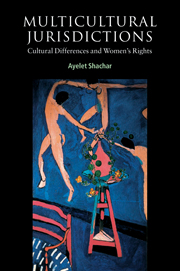Book contents
- Frontmatter
- Contents
- Preface
- 1 Introduction
- 2 The perils of multicultural accommodation
- 3 Family law and the construction of collective identity
- 4 State vs. nomos: lessons from contemporary law and normative theory
- 5 Sharing the pieces of jurisdictional authority: mapping the possibilities
- 6 Transformative accommodation: utilizing external protections to reduce internal restrictions
- 7 Conclusion
- Appendix: How transformative accommodation works in different social arenas
- References
- Index
4 - State vs. nomos: lessons from contemporary law and normative theory
Published online by Cambridge University Press: 22 September 2009
- Frontmatter
- Contents
- Preface
- 1 Introduction
- 2 The perils of multicultural accommodation
- 3 Family law and the construction of collective identity
- 4 State vs. nomos: lessons from contemporary law and normative theory
- 5 Sharing the pieces of jurisdictional authority: mapping the possibilities
- 6 Transformative accommodation: utilizing external protections to reduce internal restrictions
- 7 Conclusion
- Appendix: How transformative accommodation works in different social arenas
- References
- Index
Summary
We have already seen how well-meaning accommodation by the multicultural state can systematically put some individuals at risk, turning respect for group differences into a license to subordinate certain group members. In this chapter, the point of inquiry shifts from a formulation and evaluation of the multiculturalism paradox, to an investigation of how contemporary theoretical responses, as well as established legal models, address this conundrum. This analysis proceeds with a review of various established legal models that attempt to strike a balance between accommodating difference and respecting rights. A surprisingly broad spectrum of legal experience with accommodation is actually available, especially in the specific domain of state and religious communities' relations. We can thus identify two distinctly influential approaches for dividing legal authority between the state and the group which have developed out of the long history of the relationship between church and state. These two approaches are known here as the secular absolutist model and the religious particularist model.
Each of these legal approaches constitutes a decisive point on the continuum of accommodation. One end of this continuum can be seen in the secular absolutist model, which proposes a “strict separation of church and state” – while the religious particularist model forms the other end of this continuum, with its vision of a more expansive structure of accommodation. Historically, both first arose in response to the concerns of religiously defined nomoi groups.
- Type
- Chapter
- Information
- Multicultural JurisdictionsCultural Differences and Women's Rights, pp. 63 - 87Publisher: Cambridge University PressPrint publication year: 2001

